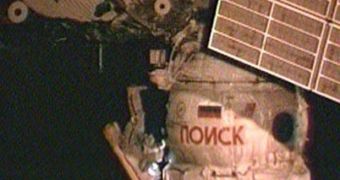Astronomers on the International Space Station (ISS) have been preparing for an extra-vehicular activity (EVA) over the past week or so, which was finally conducted yesterday, January 14. The goal of the mission was to prepare the rooftop of the lab for the new Poisk module, which is scheduled to begin operations very soon. The structure, which is the fourth Russian-built docking port for Soyuz and Progress space capsules, was delivered on the ISS in November 2009, and has been undergoing its commissioning phase ever since, Space reports.
The spacewalk began on Thursday at 5:05 am EST (1005 GMT), as the station and its crew were traveling about 210 miles (337 km) above the southern Pacific Ocean. The two Russian cosmonauts that exited the orbital facility spent about five hours and 44 minutes connecting various cables, antennas and other equipments on the rooftop of the station. Until yesterday, the module was attached at its correct location, but it was not activated, which meant that it could not be used by incoming resupply or crew-exchange missions.
During the EVA, veteran RosCosmos astronaut Oleg Kotov (third spacewalk), and cosmonaut Maxim Suraev (first spacewalk) experienced again the joy of being in outer space. The two joked with the Russian Mission Control about the space weather, as officials on the ground asked the space fliers if the weather outside the ISS was nice. “As long as it doesn't rain, we'll be fine because we didn't take any umbrellas with us I was hoping to get a suntan,” Suraev responded. “It looks great, although it's still pretty dark. Wow, am I really out?” the rookie astronaut added.
One of the reasons why the Poisk module (Mini-Research Module 2) is important to the ISS is the fact that it provides more ample room for maneuvering on the station. With the American shuttles scheduled to be retired in September, the job of resupplying the ISS, and of ensuring that all six astronauts aboard get back home safely in case of an emergency, goes mostly to the Russian space agency. Of the four Russian docking ports, two are always occupied by the Soyuz life boats that make it possible for astronauts to escape the station if the need arises. The other two can be used for a number of other maneuvering actions using resupply and garbage-carrying capsules.

 14 DAY TRIAL //
14 DAY TRIAL //